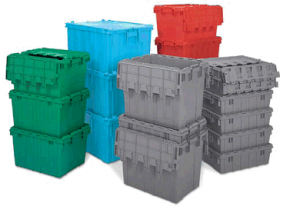 The Reusable Packaging Association last week issued new guidelines for use of reusable plastic containers, which are becoming an increasingly popular way to transport fresh and perishable products in the supply chain.
The Reusable Packaging Association last week issued new guidelines for use of reusable plastic containers, which are becoming an increasingly popular way to transport fresh and perishable products in the supply chain.
The voluntary guidelines encompass the washing, handling, storing, packing, displaying and collecting of plastic containers in the supply chain, as well as defining Hazard Analysis and Critical Control Points (HAACP) during their use and hourly, daily, monthly and quarterly testing for infection by potentially dangerous microscopic organisms.
No Reported Problems
Up until now, there has never been a documented food safety issues involving plastic containers. The purpose of the RPA’s guidelines is to keep it that way, according to Paul Pederson, chairman of RPA’s Food Safety Working Group and director of food safety and compliance at IFCO Systems, one of the program’s supporters.
“RPCs have become a pervasive and essential part of the food supply chain,” Pederson said. “It is important that each member of the supply chain has a clear understanding of their role for the safe and efficient use of RPCs. The RPA strongly encourages all companies involved in RPC use to implement these recommendations and to treat RPCs with respect and as a critical part of the food safety supply chain.”
RPCs Used More Frequently
They are certainly becoming a more common part of the supply chain. Given the popularity of renewable resources and the desire among many companies to make more green, sustainable operational choices, an increasing number of manufacturers, distributors and shippers are turning to reusable plastic containers to ship fresh fruit, produce and other perishable products.
Michael Ellis is director of supply chain development at IFCO Systems. He said it was about time for the industry to start looking for ways to regulate itself.
“I have a lot of interest and experience in standardization and I believe the reusables industry would benefit from the adoption of more standards,” Ellis said in a news release. “I’d like to have an active committee that is exploring the standards that are coming out of other countries or industries that might benefit our market.”
He added that a growing number of businesses are looking for exactly the kind of guidelines the RPA is offering.
“There are a lot of groups and markets looking at sustainability and reusables,” Ellis said. “We want to step back and take record of who is doing what and where it makes sense for the RPA to work closely with the right groups to increase the adoption of reusables.”
Key Recommendations
Among the key recommendations for growers and retailers, the RPA suggested:
- Wrapping pallets of clean RPCs
- Transporting RPCs in covered van trailers or flatbed trailers with covers
- Regular inspection of trailers
- Storing RPCs under cover, preferably indoors
- Using only RPC compliant labels
Retailers are advised to handle and load RPC pallets like any other packaged commodity.
The RPA also recommended that retailers and growers both take steps to properly secure and store used RPCs so that potential contamination of products and materials can be minimized.
